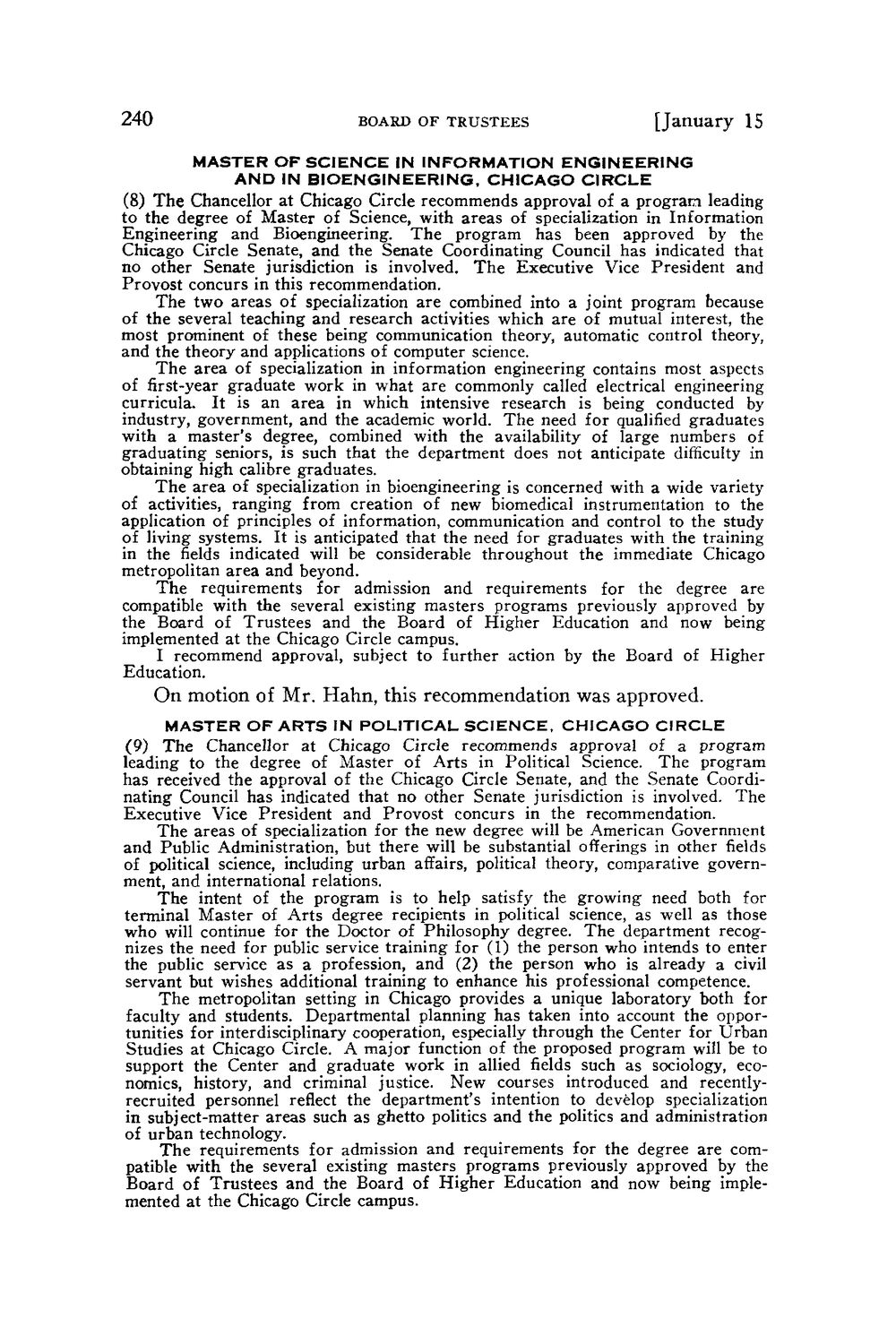| |
| |
Caption: Board of Trustees Minutes - 1970
This is a reduced-resolution page image for fast online browsing.

EXTRACTED TEXT FROM PAGE:
240 BOARD OF TRUSTEES [ J a n u a r y 15 MASTER O F S C I E N C E IN INFORMATION ENGINEERING AND IN B I O E N G I N E E R I N G , CHICAGO C I R C L E (8) T h e Chancellor at Chicago Circle recommends approval of a program leading to the degree of Master of Science, with areas of specialization in Information Engineering and Bioengineering. T h e program has been approved by the Chicago Circle Senate, and the Senate Coordinating Council has indicated that no other Senate jurisdiction is involved. T h e Executive Vice President and Provost concurs in this recommendation. The two areas of specialization are combined into a joint program because of the several teaching and research activities which are of mutual interest, the most prominent of these being communication theory, automatic control theory, and the theory and applications of computer science. T h e area of specialization in information engineering contains most aspects of first-year graduate work in what are commonly called electrical engineering curricula. It is an area in which intensive research is being conducted by industry, government, and the academic world. The need for qualified graduates with a master's degree, combined with the availability of large numbers of graduating seniors, is such that the department does not anticipate difficulty in obtaining high calibre graduates. T h e area of specialization in bioengineering is concerned with a wide variety of activities, ranging from creation of new biomedical instrumentation to the application of principles of information, communication and control to the study of living systems. It is anticipated that the need for graduates with the training in the fields indicated will be considerable throughout the immediate Chicago metropolitan area and beyond. T h e requirements for admission and requirements for the degree are compatible with the several existing masters programs previously approved by the Board of Trustees and the Board of Higher Education and now being implemented at the Chicago Circle campus. I recommend approval, subject to further action by the Board of Higher Education. On motion of Mr. Hahn, this recommendation was approved. MASTER O F A R T S IN POLITICAL S C I E N C E , CHICAGO CIRCLE (9) The Chancellor at Chicago Circle recommends approval of a program leading to the degree of Master of Arts in Political Science. The program has received the approval of the Chicago Circle Senate, and the Senate Coordinating Council has indicated that no other Senate jurisdiction is involved. The Executive Vice President and Provost concurs in the recommendation. The areas of specialization for the new degree will be American Government and Public Administration, but there will be substantial offerings in other fields of political science, including urban affairs, political theory, comparative government, and international relations. The intent of the program is to help satisfy the growing need both for terminal Master of Arts degree recipients in political science, as well as those who will continue for the Doctor of Philosophy degree. The department recognizes the need for public service training for (1) the person who intends to enter the public service as a profession, and (2) the person who is already a civil servant but wishes additional training to enhance his professional competence. T h e metropolitan setting in Chicago provides a unique laboratory both for faculty and students. Departmental planning has taken into account the opportunities for interdisciplinary cooperation, especially through the Center for Urban Studies at Chicago Circle. A major function of the proposed program will be to support the Center and graduate work in allied fields such as sociology, economics, history, and criminal justice. New courses introduced and recentlyrecruited personnel reflect the department's intention to develop specialization in subject-matter areas such as ghetto politics and the politics and administration of urban technology. T h e requirements for admission and requirements for the degree are compatible with the several existing masters programs previously approved by the Board of Trustees and the Board of Higher Education and now being implemented at the Chicago Circle campus.
| |